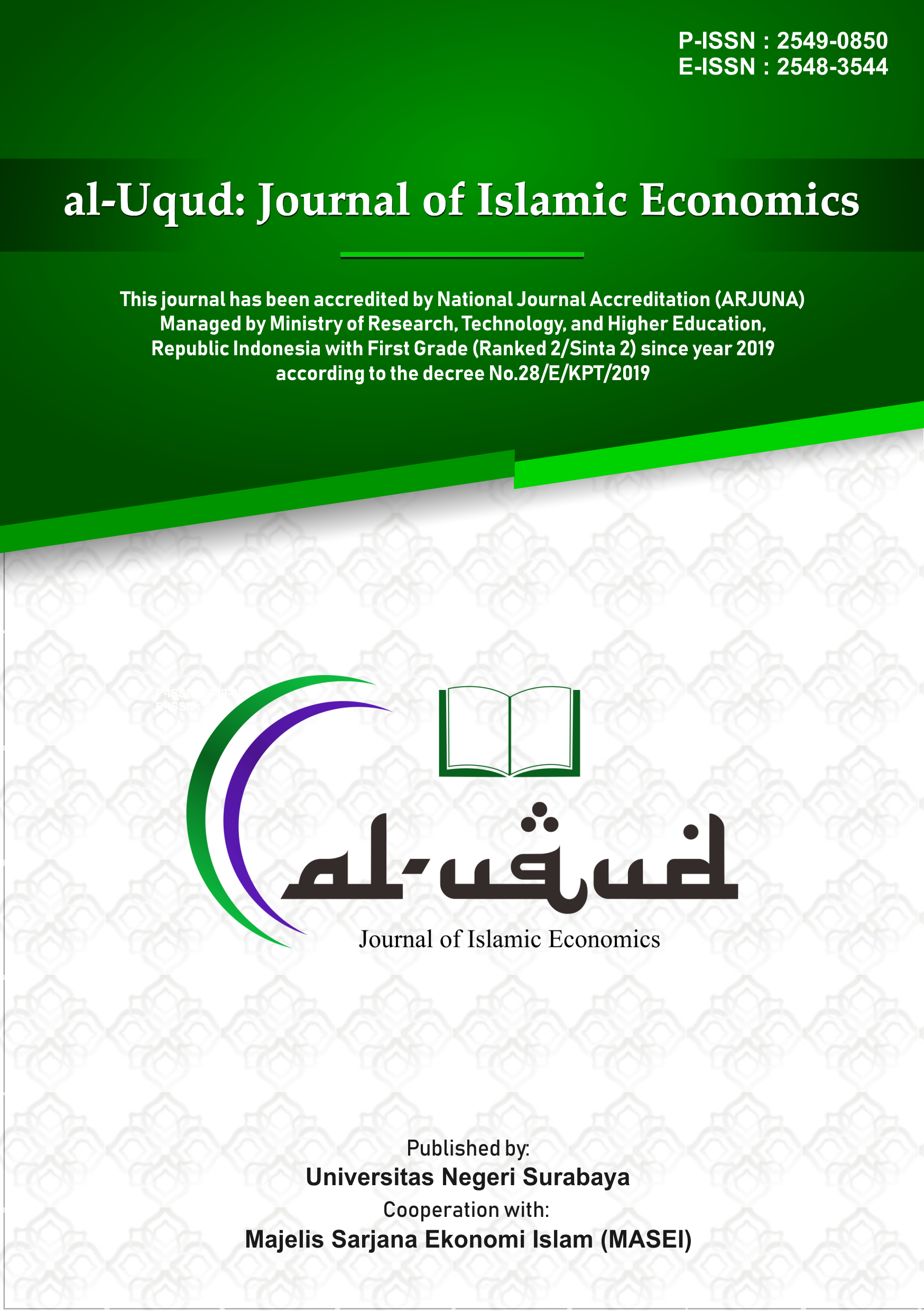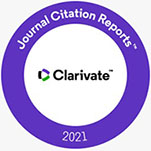Revealing well-educated millenials' purchase intention on halal cosmetics: The role of knowledge, religiosity, and attitude
DOI:
https://doi.org/10.26740/aluqud.v7n1.p95-109Keywords:
Halal cosmetics, Knowledge, Millennial, Purchase intention, ReligiosityAbstract
This study aimed to analyze and discuss the influence of knowledge, religiosity, and attitude on well-educated Muslim women Millenials’ interests in buying halal cosmetics in a state with a Muslim majority. The judgemental sampling technique was applied to take samples using an online questionnaire. Two hundred twenty-three respondents were collected, yet, only 210 well-educated Muslim women with minimum ages of 21 years old could participate. Data is analyzed using path analysis to see the correlation among variables. The result found that well-educated Muslim women Millenials had a positive interest in buying halal cosmetics. Besides any information about halal cosmetics products, their belief level on their religion significantly affected their attitude and interests in buying. It found that most of the respondents knew halal cosmetics from the internet through open questions. Although a state with a Muslim majority becomes the research location, many people still used cosmetics with no halal certificates. Therefore, marketers should advertise their halal products, mainly through digital media. This study focused on consumers' attitudes toward rapid-growth cosmetics products in Indonesia, and it referred to halal cosmetics. Also, this study focused on the millennials generation who had an age group with the most number. Therefore, it was necessary to put this issue into a marketing discussion.
References
Adiba, E.M. (2019), Consumer Purchasing Behavior of Halal Cosmetics: A Study On Generation X and Y, Journal of Islamic Monetary Economics and Finance, 5(1), 169-192. https://doi.org/10.21098/jimf.v5i1.1052
Anastasia, N., Setiadiwiria, O.C. and Kunto, Y.S. (2019). Difference between financial intelligence on millennials, gen x, and baby boomers. BISMA (Bisnis Dan Manajemen), 12(1), 15-28. https://doi.org/10.26740/bisma.v12n1.p15-28
Blackwell, R.D., Miniard, P.W. and Engel, J.F. (2012). Consumer Behavior, edited by Tan, P.K.., Cengage Learning Asia Pte Ltd, Singapore.
Halal Mui. (2019). Lppom MUI | Lembaga Pengkajian Pangan Obat-obatan dan Kosmetika Majelis Ulama Indonesia. Www.Halalmui.Org, available at: https://www.halalmui.org/mui14/main/page/faq-sertifikasi-halal (accessed 14 March 2020).
Hassan, Y. and Pandey, J. (2019). Examining The Engagement of Young Consumers for Religiously Sanctioned Food: The Case of Halal Food in India. Young Consumers, 21 (2), 211-232. https://doi.org/10.1108/YC-01-2019-0940.
Indonesia. (2020), "Agama", www.indonesia.go.id, https://indonesia.go.id/profil/agama (accessed 20 November 2020).
Ishak, S., Che Omar, A.R., Khalid, K., Ab. Ghafar, I.S. and Hussain, M.Y. (2019). Cosmetics purchase behavior of educated millennial Muslim females. Journal of Islamic Marketing, Emerald, 11(5), 1055-1071. https://doi.org/10.1108/JIMA-01-2019-0014
Khan, A. and Azam, M.K. (2016). Factor Influencing Halal Products Purchase Intention in India: Preliminary Investigation. The IUP Journal Marketing Management, 15(1). 56-62.
Khan, N., Sarwar, A. and Tan, B.C. (2020). Determinants of purchase intention of halal cosmetic products among Generation Y consumers. Journal of Islamic Marketing, 12(8), 1461-1476. https://doi.org/10.1108/JIMA-11-2019-0248
Lada, S., Harvey Tanakinjal, G. and Amin, H. (2009). Predicting Intention to Choose Halal Products Using Theory of Reasoned Action. International Journal of Islamic and Middle Eastern Finance and Management, 2(1), 66-76. https://doi.org/10.1108/17538390910946276
Malhotra, N.K., Nunan, D. and Briks, F.D. (2012), Marketing Researh An Applied Approach, Fourth., Pearson Educated Limited, Edinburgh.
Nurhayati, T. and Hendar, H. (2019). Personal intrinsic religiosity and product knowledge on halal product purchase intention Role of halal product awareness. Journal of Islamic Marketing, 11(3), 603-620. https://doi.org/10.1108/JIMA-11-2018-0220.
Ramadhani, M. (2018). Apa Perbedaan Izin Depkes dari BPOM dan Sertifikasi Halal dari MUI? - kumparan.com. Www.Kumparan.Com, available at: https://kumparan.com/maulidina-ramadhani/apa-perbedaan-izin-depkes-dari-bpom-dan-sertifikasi-halal-dari-mui (accessed 1 April 2020).
Setiawati, L.M., Chairy, C. and Syahrivar, J. (2019). Factors Affecting the Intention to Buy Halal Food by the Millennial Generation: The Mediating Role of Attitude. DeReMa (Development Research of Management): Jurnal Manajemen, 14(2), 175-188. http://dx.doi.org/10.19166/derema.v14i2.1738
Standard, D. and Reuters, T. (2018). State of the Global Islamic Economy Report 2018/2019, Dubai International Financial Centre. available at: https://www.dinarstandard.com/.
Sumarwan, U. (2014), Perilaku Konsumen, Ghalia Indonesia, Bogor.
Tranggono, R.I. and Latifah, F. (2007), Buku Pegangan Ilmu Pengetahuan Kosmetik, Gramedia Pustaka Utama, Jakarta.
Vristiyana, V.M. (2019). Pengaruh Religiusitas dan Pengetahuan Produk Halal Terhadap Penilaian Produk Halal dan Minat Pembelian Produk Halal. Jurnal Ekonomi dan Bisnis, 20(1), 85-100. http://dx.doi.org/10.30659/ekobis.20.1.85-100
Downloads
Published
How to Cite
Issue
Section
License
Copyright (c) 2023 The author(s)

This work is licensed under a Creative Commons Attribution 4.0 International License.
CC BY 4.0 Abstract views: 899
,
Abstract views: 899
, PDF Downloads: 1014
PDF Downloads: 1014








